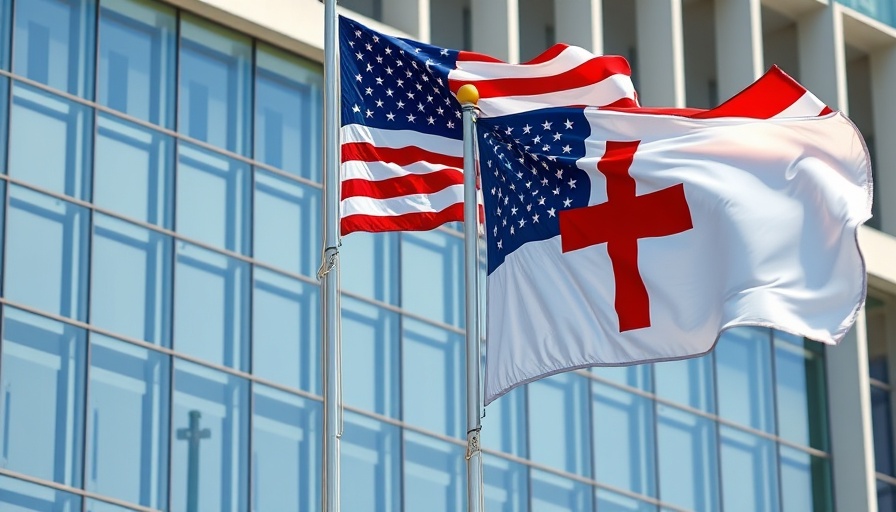
Understanding the 'Appeal to Heaven' Flag: Its Historical Roots and Modern Context
The 'Appeal to Heaven' flag's historical origins trace back to the American Revolutionary War. Originally, it symbolized the claim for independence and government derived from the people's consent—a poignant reminder of the ideals the U.S. was founded upon. However, its trajectory has taken a sharp turn into the realm of politics and social movements. Today, it has become emblematic of a specific brand of Christian nationalism, tapping into a narrative that seeks to merge faith with governance.
Implications of Displaying the Flag on a Government Building
Recently, the flag was controversially flown at the Small Business Administration (SBA) headquarters in Washington, D.C., alongside the American flag during a Flag Day ceremony led by Kelly Loeffler. This event catalyzed renewed discussions about the growing influence of Christian nationalism within American political spheres. Jon Lewis, a researcher at the Program on Extremism, emphasized that the flag’s presence on government property should concern those who value the secular framework of American democracy, highlighting that it signals a disturbing normalization of religious symbols in political contexts.
The Connection to January 6 and the Far Right
The flag's appearance is not just an isolated incident but rather a reflection of the broader far-right movements which culminated during the January 6 Capitol riots. As rioters brandished the flag, it became a rallying point for those who reject the outcomes of democratic processes, aligning closely with the 'Stop the Steal' movement. Critics perceive this allegiance as a troubling indication of how far some factions are willing to go to infuse their religious beliefs into the fabric of American governance.
Political Responses and Reactions
Political figures, including House Speaker Mike Johnson, have expressed support for the flag, often citing ignorance about its associations with extreme right-wing ideologies. This defense, however, appears to reveal a deeper issue—the possibility of selective engagement with symbols based on convenience rather than understanding. As leaders display the flag and engage in dialogues about its meaning, the ramifications of such actions ripple through the socio-political landscape, particularly for younger generations who might interprete these symbols differently. The flag's use raises critical questions about loyalty to democratic principles versus religious affiliation.
Future Predictions: The Intersection of Religion and Politics
As we move into a new political landscape, the trend of integrating religious symbols into public life is likely to gain further traction. Observers forecast that this could lead to intensified debates over the boundaries between church and state. For many, the implications are alarming: a possible trajectory toward a form of governance that intertwines religious ideologies with political mandates. This evolution poses risks not just to secularism in the U.S., but also to the evolving identity of a nation founded on diversity and pluralism.
The Role of Technology in Political Narratives
In the digital age, symbols like the 'Appeal to Heaven' flag can rapidly proliferate through social media, and this fast dissemination can both inform and misinform public awareness. Furthermore, technology's role in shaping narratives around these symbols cannot be understated. As we witness an increasing number of political movements leveraging digital platforms to disseminate their messages, understanding how technology intersects with these developments becomes critical. Armed with modern tools, factions can amplify their beliefs to wider audiences, thereby increasing their legitimacy and reach.
Engaging with the Conversation: What Can We Do?
As citizens navigate these complex discussions, cultivating a robust understanding of the implications of political symbols becomes paramount. Engaging in informed conversations about the intersections between faith, politics, and national identity may lead to more nuanced debates rather than polarized extremes. A balanced dialogue rooted in education can empower individuals to critically assess the significance of symbols like the 'Appeal to Heaven' flag within their cultural and political contexts.
In light of these developments, we encourage you, the reader, to remain vigilant and informed about the narratives influencing our political landscape. Engaging with the ideas presented in this article can prompt further exploration into how symbols, faith, and governance intersect, shaping the fabric of American democracy.
 Add Row
Add Row  Add
Add 




Write A Comment